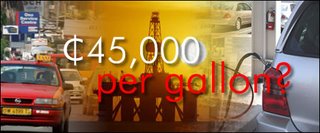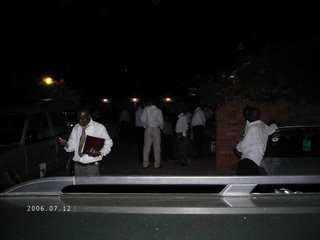 It is an article of irony that the very week that my organisation is discussing the liberalisation of services under the World Trade Organisation, and the adverse impacts it will have on gender, development, and community rights at our Pan-African meeting is the same time that the government allows so-called Oil Marketing companies, which I wrote about back in 2005 when I attended a meeting in which the then-Minister of Energy Professor Mike Ocquaye extolled the virtues of liberalising the downstream sector of Ghana's petroleum sector, to raise petroleum prices from 10-15%.
It is an article of irony that the very week that my organisation is discussing the liberalisation of services under the World Trade Organisation, and the adverse impacts it will have on gender, development, and community rights at our Pan-African meeting is the same time that the government allows so-called Oil Marketing companies, which I wrote about back in 2005 when I attended a meeting in which the then-Minister of Energy Professor Mike Ocquaye extolled the virtues of liberalising the downstream sector of Ghana's petroleum sector, to raise petroleum prices from 10-15%. All this simply goes to confirm the increasingly neoliberal stance that the government of Ghana is adopting to its people.
Now that the rate of petrol is at exactly $US5.00/gallon, how are Ghanaians supposed to manage? Where are the safety nets in place that the government should be thinking about to cushion its citizens from the effects of the world market? SO, just because there is a serious inter-necine conflict going on in the Middle East, where Hezbollah is being targetted for wiping out by the Israelis, so we, in the developing world, have to suffer the consequences?
Now this issue was, thankfully, raised by Bernard Avle of the CITI Breakfast Show the beginning of this week, which was great.
Having said that, as much as I praise CITI-FM, I really think that the media does woefully in presenting to the public key issues, such as the challenge of liberalisation of services.
Liberalisation of services is merely a big word for opening up the services sector (tourism, finance, banking, waste disposal, etc) to the degree that foreign investors can come into this country--and any other developing country--and enjoy "national treatment"(in ther words, the same type of treatment and beenfits accorded indigenous enterprises) and tax exemptions so that they can charge fees on the locals, and expropriate (take away) profits from this country to theirs, or simply offshore, and out of this country. Much like the telecommunication companies of AREEBA and TIGO do. Didn't know? Now you do...
The question is: to what extent can public opinion be awakened to the urgency of these issues by way of the media, without it necessarily coming from civil society activists, like myself, who already are perceived in one way or another by policy-makers and the media alike for having more time on their hands than the media.
I think Dr.Graham, Coordinator of TWN-AFrica, hit the nail on the head when he...
...called on the media to offer analysis of the law governing the provision of services and generate debate that would enhance major transformations of the service sector
from: TWN discusses challenges of service liberalisation.
My final point is this: liberalisation and privatisation has been with us since the Reagan-Thatcher nexus, which in my view, was "the greatest exponent of a modern and amoral Realpolitik", as maintained by US historian Norman Rich in his classic book "Great Power Diplomacy".
That said, with the increasing and growing appetite of the US and EU for African markets on water, health and whatnot sector, they threaten to LOCK-IN permanently any commitments our clueless and hapless and uninformed African governments may be faced with.
The time for resistance against this locking in of liberalisation, or forever facing compensation of ALL WTO members is nigh...unless Africa wakes up -- seriously.
TAgs: Ghana liberalisation; Ghana petroleum; services liberalisation; services

